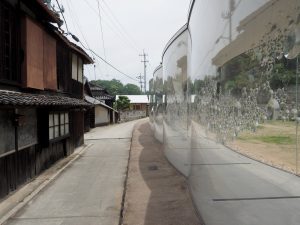Architecture for Japan’s Shrinking Cities
Feb. 26, 2020
12:00-1:00 pm
Asian Centre, Room 604

S-Art House, Haruka Kojin and Kazuyo Sejima, Inujima (Photo Credit: Mari Fujita)
Within Japan, the growing aging population conflated with the shrinking of cities, is giving rise to new strategies to stabilize local economies and slow down the population decline. Within the field of architecture, a variety of approaches have been tested throughout the past few decades to mixed success. What the recent approaches share is the offering of architecture with a capital A; the offering of buildings as a solution. This research looks to consider alternative modes of practice that conceive of the architect as possessing relevant knowledge and skills that can be directed towards positive social and spatial transformation.
 Mari Fujita is an Associate Professor in the UBC School of Architecture and Landscape Architecture, and Chair of the Bachelor of Design Program. Her research focuses on the spatial and cultural effects of urban change. Her design studios and seminars explore emergent forms of urbanism with a focus on Vancouver and other regions experiencing rapid growth or decline. Mari maintains a design practice, Fubalabo, which has pursued diverse projects including material studies, wearables, gallery installations, interiors, building designs, and urban proposals. She has worked as an architect in both New York and Berlin. Mari received a B.A. from Columbia University and an M.Arch from Princeton University.
Mari Fujita is an Associate Professor in the UBC School of Architecture and Landscape Architecture, and Chair of the Bachelor of Design Program. Her research focuses on the spatial and cultural effects of urban change. Her design studios and seminars explore emergent forms of urbanism with a focus on Vancouver and other regions experiencing rapid growth or decline. Mari maintains a design practice, Fubalabo, which has pursued diverse projects including material studies, wearables, gallery installations, interiors, building designs, and urban proposals. She has worked as an architect in both New York and Berlin. Mari received a B.A. from Columbia University and an M.Arch from Princeton University.